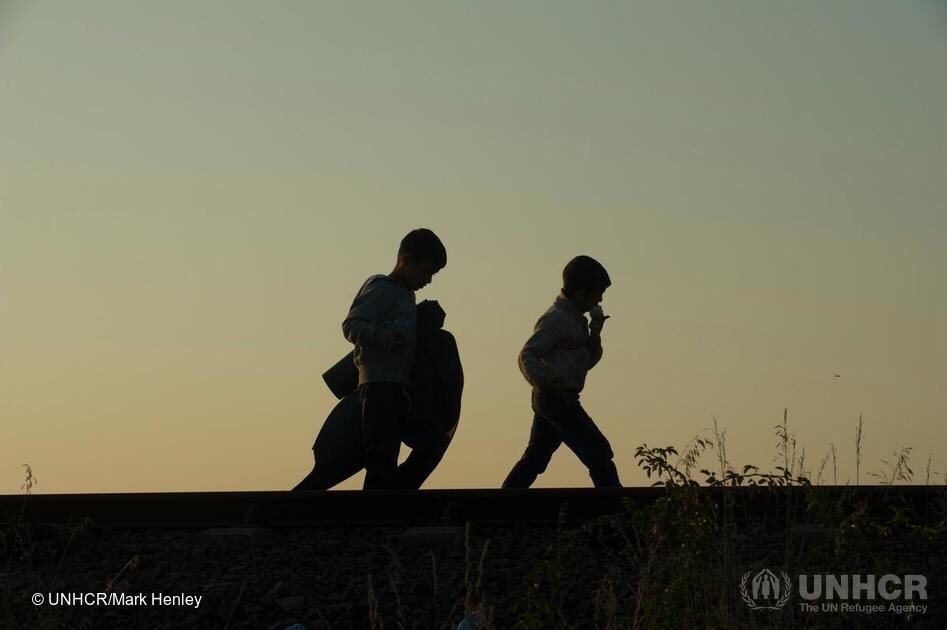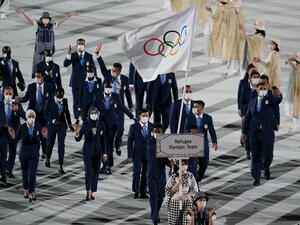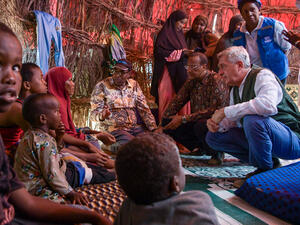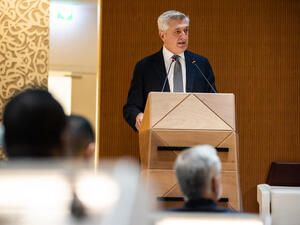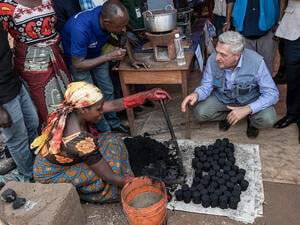Grandi urges boost for multilateralism to tackle record displacement
Grandi urges boost for multilateralism to tackle record displacement

Filippo Grandi, United Nations High Commissioner for Refugees, speaks during the sixty-ninth session of the Executive Committee.
GENEVA – UN refugee chief Filippo Grandi today called for a push to reinvigorate multilateralism to curb growing conflicts and deepening crises that have driven record numbers of people from their homes worldwide.
"The principles and values of international cooperation have come under immense pressure,” Grandi said in his opening address to the annual meeting of the Executive Committee of UNHCR, the UN Refugee Agency.
“Yet, amidst so much adversity, multilateralism has held its ground. But … we must reinvigorate it.”
Since he took office at the start of 2016, Grandi said internal conflicts had grown and crises had intensified - driven by regional and international rivalries, and fuelled by poverty, exclusion and climate change.
Meanwhile, the language of politics has "become ruthless, giving licence to discrimination, racism and xenophobia”.
Calling it a “milestone” in multilateral cooperation, Grandi said the 2016 New York Declaration for Refugees and Migrants showed political commitment at the highest level, grounded in international cooperation and refugee protection standards.
“The principles and values of international cooperation have come under immense pressure.”
And he welcomed the global compact on refugees, to be validated by the General Assembly later this year, as charting “a clear way forward, through a stronger, fairer, better response model”.
“This, I believe, is where multilateralism has strength – as a practical counterpoint to the rhetoric and electoral grandstanding that often pervades public debates on refugees and migrants.”
Taking stock at the midway point of his five-year mandate as High Commissioner, Grandi noted that crises including in Syria, the Central African Republic, the Democratic Republic of Congo and northern Central America, had continued to evolve, while others, as in Yemen, had escalated. Some - as in Iraq, the Lake Chad region and South Sudan, had moved in the direction of greater stability, but without a definitive resolution.
New crises had emerged, “with harrowing consequences”, first among them the brutal security operation in Myanmar’s Rakhine State that drove 720,000 Rohingya into Bangladesh after August last year.

Grandi’s address to the 69th session of the Executive Committee comes at a time when global forced displacement has climbed to an unprecedented 68.5 million, including 25.4 million refugees and 40 million internally displaced people.
Grandi noted that thousands continued to cross the Sahel into Libya and across the central Mediterranean to Europe “driven by despair, and exposed to unthinkable cruelty and dangers.”
He called for access to asylum in Europe to be preserved. "Rescue at sea," he said, "has been taken hostage by politics. Responsibility-sharing has been replaced by responsibility-shifting."
Highlighting UNHCR’s protection work in Libya, he reported that an evacuation programme has flown close to 1,850 refugees and asylum seekers to safety, most to Niger, with the aim of onward resettlement, alongside a programme for the voluntary return of migrants carried out by the International Organization for Migration.
He emphasised the need for more evacuation options, resettlement places and strategic investments to tackle the conflicts and development problems behind these flows.
Further protection challenges had emerged in Latin America, where some 5,000 people are leaving Venezuela daily, for which a non-political and humanitarian approach was proving “essential to help states receiving them in growing numbers”.
Grandi said a second core strategic commitment was to respond “quickly, reliably and effectively in emergencies, laying the ground for solutions from early on.” He gave as an example the shared response to the displacement of Rohingya refugees to Bangladesh.
He praised the “profound generosity and compassion” of local people – who were the first to respond – and flagged a large-scale emergency preparedness drive to safeguard refugees from the looming monsoon, steered by Bangladesh, together with humanitarian partners, non-government organizations and refugees themselves.
“This massive effort reaffirmed what we are collectively capable of, when people desperately need our help,” he told the forum. But attention is now needed for more stable mid-term arrangements in Bangladesh must now be pursued, as well as building solutions inside Myanmar.
Among other strategic efforts since he took office were the empowerment and inclusion of refugees, while solutions to their displacement were sought.
Granting aslym has helped “save lives, build and rebuild nations, and preserve our sense of humanity.”
Grandi highlighted the profound transformation “in which decades of keeping refugees apart, consigned to camps, or on the margins of society, are giving way to a fundamentally different approach of including refugees in national systems, and the societies and economies of their host countries".
He said the Comprehensive Refugee Response Framework had provided a vehicle for these efforts in the 15 countries where it had been applied and would grow in significance as an integral part of the global compact on refugees.
He praised the way the leadership and expertise of the World Bank have helped trigger a fundamental change in how development entities engage with large-scale refugee flows and internal displacement.
Speaking to the forum, World Bank CEO Kristalina Georgieva said that while the humanitarian and development worlds once remained apart, now there is ever-closer cooperation.
“The very fact that I stand in front of you today is the evidence that we are seeing a seismic shift in the way we approach humanitarian emergencies. We have brought the two worlds together,” she said.
Grandi also flagged the need for adaptation, as situations – including inside Syria and elsewhere – continued to evolve. This required UNHCR to be “flexible and agile” in the field, he said, describing the internal reform process that UNHCR was currently pursuing.
He underscored his commitment to the highest standards of integrity in UNHCR's operations, and described far-reaching measures to prevent and address sexual exploitation and abuse and sexual harassment.
In closing, he reiterated the vital role that the global compact on refugees will play, as a “rallying point for humane, practical people from all parts of society” and noted that granting asylum is an ancient tradition, that has helped “save lives, build and rebuild nations, and preserve our sense of humanity.”
The full text of the speech is available here.

